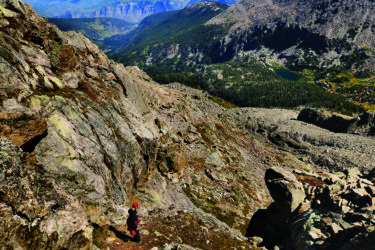The Local newsletter is your free, daily guide to life in Colorado. For locals, by locals.
When Jason Smith walked through his front door on May 17, his wife cheered. He had just completed a duathlon—a 5k run, 20k bike ride, followed by a 2.5k run. However, this race was different; instead of competing with others, Smith ran solo around his neighborhood in Highland and biked indoors.
Smith, 35, was training for the Barkin’ Dog Duathlon at Cherry Creek State Park and the BolderBoulder when both were canceled due to state and local restrictions aimed at slowing the spread of COVID-19. This left many racers mid-training not knowing what was next.

David Manthey, race director for Bear Chase Race Series, puts on races in Castle Rock, Buffalo Creek, Highlands Ranch, and Lakewood. He had to cancel one race in the series and postpone another. According to Bear Chase Race Series’ website, the last two races in the series are slated in late July and late September. Manthey has been the race director for 10 years and says he has “no clue what’s going happen” with the September race. “[I’m] cautiously optimistic because it’s so far out that we should be okay. But I’m 100 percent at the mercy of the park rangers who work for the city of Lakewood…So I have no idea if Bear Creek Lake Park is going to allow us to hold the race or not.”
He’s not the only race organizer facing an uncertain future. Iconic races across the state have been canceled: The Colfax Marathon, Revel Rockies, Leadville Trail 100 Run, Golden’s Dirty 30, and the Colorado Marathon to name a few are off the books in 2020.
Virtual races are still an option, Manthey says. In the meantime, he and ultrarunner Bryan Williams created an online challenge. The Virtual Colorado Trail Challenge, which takes place from June 1 through September 3, gives runners a chance to run 500 miles in 95 days covering the distance of the Colorado Trail. But for many racers, virtual runs just aren’t the same. Smith participated in a virtual duathlon but says the experience was not what he wanted or needed. “So I took matters into my own hands and chose two arbitrary dates that I could train for,” he says, adding his second race will take place on June 27.
Still running and biking eight to 10 hours a week, Smith is not alone, as many Coloradans who were hoping to compete this year are finding new ways and motivation to stay active, including running geometric-inspired routes and working to hit major milestones.
Matt Sandy, 38, has been running geometric routes that look like an alligator and some that look like spreadsheets around the Cole neighborhood where he lives. Sandy says he’s maintaining a 10-mile radius around his house to abide by the state’s Safer at Home mandate. This is his way of keeping himself entertained knowing future races are up in the air.
For the last five years Highlands Ranch resident Tonya Fuller has been preparing to kick off her 50th birthday by running the Marathon du Medoc, a nearly 42.2k race in France where participants indulge in wine and food along the way. With the race canceled, Fuller decided to make her own medals and still run. “I kind of decided I was going to do my own 50k on my 50th birthday,” she says. “I reached out to a couple of my trail running friends and said, ‘Look, obviously this was supposed to be a really big year. Everything’s falling apart so I’m still going to do something epic.’”
Several runners say running is in their blood and canceled races won’t stop them from getting outside and being active. Golden resident Rachelle Pizarro, 38, was training for a 171k (106.25-miles) race in France and recently found out it was canceled. She says running is a form of therapy. “I’ll always have the need to get out on the trail. It’s a lifestyle.”
Still, not everyone has found the motivation to train without races. Aurora resident Jen Blankenship, 32, was running up to 16 miles four to five days a week, but with races canceled she scaled back to five- or six-mile runs on the weekends. “My motivation for running isn’t gone,” she says. “But the motivation to run super far is pretty much non-existent now.”








